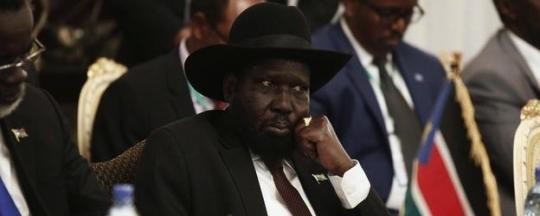The East African regional bloc IGAD says that the plan to create 28 new states in South Sudan is 'inconsistent' with the peace agreement signed last year and should be suspended.
IGAD's executive secretary plus foreign ministers of seven East African nations convened in Addis Ababa on Saturday and Sunday for an extraordinary meeting that discussed President Salva Kiir's recent decrees to create 28 new states in place of the country's ten constitutionally established states.
In a communique issued after the meeting, the Council of Ministers urged the South Sudanese government to stop the process of creating new states until after a review by a national boundaries commission.
The communique refers to “absence of agreement on the creation of new states” and expresses concern at the steps taken by the South Sudanese government to create the new states. “Such action is inconsistent with the terms of the Agreement to Resolve the Conflict in South Sudan,” the statement says.
The IGAD ministers stressed that this issue should not delay formation of the Transitional Government of National Unity. However, Festus Mogae, head of the independent commission that monitors the peace implementation, disclosed separately that the government “refuses to agree to a new text for the transitional constitution that does not provide for 28 states.”
“Both the SPLM/A (In Opposition) and the SPLM (Former Detainees) have made clear their opposition to the formation of 28 states,” explained Mogae, referring to the other two main signatories of the peace deal. “The Government’s action has led to an impasse and a challenge in sequencing the implementation of the Agreement.”
In view of this, the IGAD ministers recommended moving forward with creation of the national power-sharing government and allowing “an inclusive, participatory National Boundary Commission comprising all Parties to ARCSS” to later review the proposed states and their boundaries over the course of a month.
In a related development, the United States envoy to South Sudan, Donald Booth, revealed last week that his country was lobbying for the creation of such a boundaries commission. In an interview with Eye Radio, he expressed optimism that the parties could negotiate a compromise on when and how new states would be created, after the formation of the national power-sharing government.
Booth pointed out that some communities feel threatened by the new administrative boundaries, citing the example of Malakal. The Shilluk tribe consider Malakal part of their territory. Before the town's destruction and abandonment in 2014, Malakal was a multi-ethnic city and served as the capital of the multi-ethnic Upper Nile State. Under Kiir's plan, however, it would fall within the predominantly Dinka 'East Nile State'.
“It is not just a legalistic issue,” said Booth. “There are indeed some very serious concerns by some of the ethnic communities – and I would take, for example, the concerns of the Shilluk about the status of Malakal as one example – that do need to be addressed. These are not legalistic issues these are very serious, real life issues. So we have urged that an all-parties boundaries commission be established to work out these problems going forward.”
The US diplomat added, “Clearly the 28 states was not consistent with the peace agreement, but a way has to be found to move forward on implementing the agreement.” Booth stressed that it would be better for the transitional government to form at the national level first, and then for the issue of states to be discussed by this government later.
Critics of Kiir's plan have said that it creates ethnic enclaves and annexes land and oil resources to the president's own tribe, the Dinka. Opposition parties in Juba tried to take the president to court over the issue, saying his decrees were unconstitutional, but the chief justice of the supreme court has publicly endorsed the president's plan in a congratulatory newspaper advert and he has thus far declined to hear the case in court.
Proponents of the plan say that it will “take the towns to the people,” bringing more development and government jobs at the grassroots level. Kiir has defended his decision to create new states, saying it is a demand of the people and cannot be reversed.
The president issued two decrees attempting to effect the plan, the first on 2 October 2015 and the second on 24 December 2015, appointing 28 new governors. Some of the new governors have still not traveled to their posts and state administrations and state-level parliaments in some of the new administrative areas are effectively non-existent.
The IGAD ministers have asked the UN Security Council to review progress on peace implementation within two weeks.
File photo: Salva Kiir



